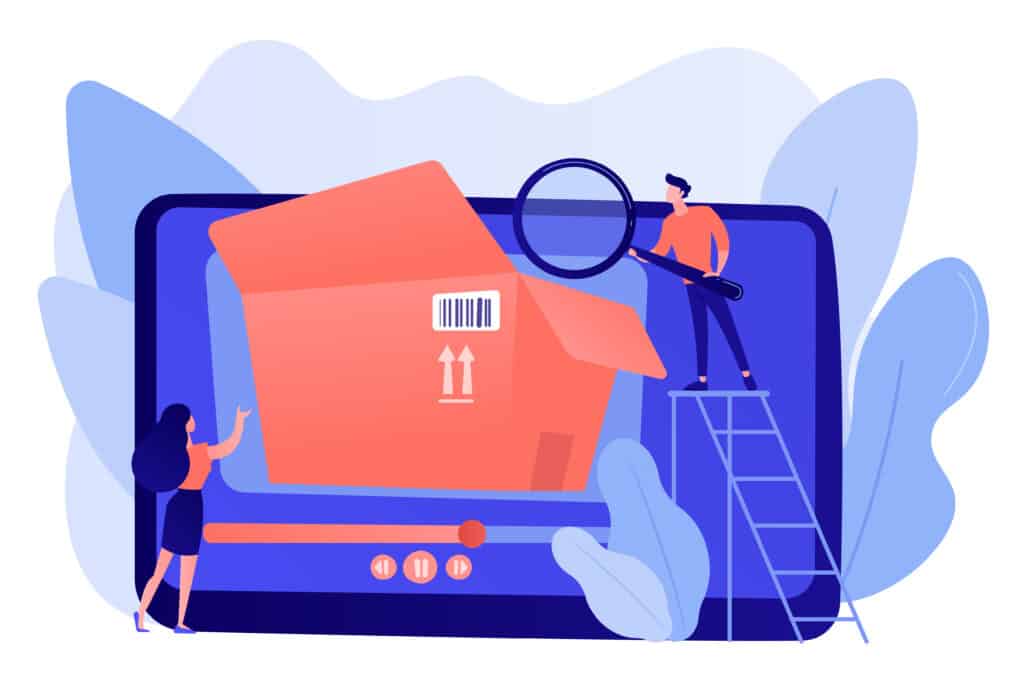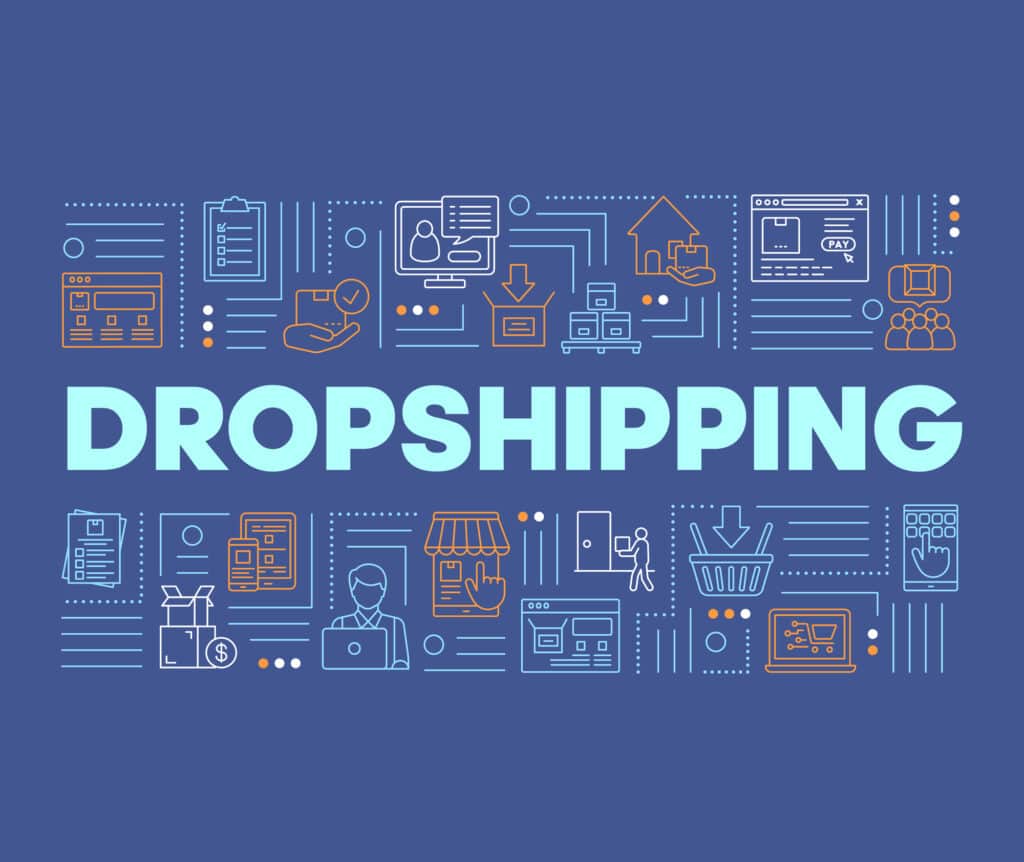
Download Your List Of
The 20 Best
Dropshipping Suppliers
Marketing Your Private Label Dropshipping Businessropshipping? Taking the reins of your own production, you get to choose which characters appear and determine how it all unfolds – this time with products as the stars. Only this time, it’s products on a virtual stage.
With e-commerce, you can find multiple options for selling your products online. But imagine being able to pick a product from any corner of the globe, slapping your brand name on it without worrying about inventory or shipping logistics? Sounds dreamy right?
This is no mere fantasy but an actual business model – private label dropshipping! With its promise for higher profit margins and flexibility compared with other models.
Intrigued? Well stick around as we dive deeper into understanding what exactly private label dropshipping entails and how you can start one yourself!
Table of Contents:
- Understanding Private Label Dropshipping
- Starting Your Own Private Label Dropshipping Business
- Key Stats:
- Operational Management in a Private Label Dropshipping Business
- Private Label Dropshipping in Various Industries
- Best Practices for Success in Private Label Dropshipping
- Navigating Challenges in Private Label Dropshipping
- Marketing Your Private Label Dropshipping Business
- FAQs in Relation to Private Label Dropshipping
- Conclusion
Understanding Private Label Dropshipping
If you’ve taken a stab at selling online, chances are you may have encountered terms like private label and dropshipping. But what happens when these two are combined? Welcome to the world of private label dropshipping.
Defining Private Label Dropshipping
Alibaba’s guide on business models explains that private label dropshipping is a unique model where entrepreneurs sell products under their own brand but don’t hold any inventory. Instead, they work with suppliers who produce and ship items directly to customers on behalf of the entrepreneur.
This approach allows for flexibility while eliminating many logistical headaches associated with traditional retail businesses such as stock management and shipping logistics. Moreover, private label dropshipping enables brands to build customer loyalty by offering high-quality and distinctive products not available elsewhere.
Advantages of Choosing Private Label Dropshipping
The benefits extend beyond convenience and ease-of-use though. A major perk lies in potential profit margins: unlike standard reselling practices where profits may be slim due to stiff competition; selling custom-branded goods typically commands higher prices – boosting profitability significantly.
In addition, compared to other online business models like affiliate marketing or merchandising third-party goods through Amazon FBA (Fulfillment By Amazon), this model gives sellers more control over product quality since they get to choose which supplier manufactures their items – an aspect critical for maintaining a strong brand reputation.
- You build customer loyalty thanks to superior product quality from chosen manufacturers,
- Your chances at securing larger orders increase due do bespoke offerings appealing more specifically towards your target market,
- The possibility exists for expanding into different niches without substantial upfront investment.
When we take all these benefits into account, it’s no wonder why so many budding entrepreneurs and established businesses alike are looking to start their own private label dropshipping ventures. Before launching a private label dropshipping venture, it’s essential to do the necessary research and planning while keeping customer needs at the forefront. So make sure you’re prepared before diving in.
Private label dropshipping blends the benefits of e-commerce flexibility and branding power. It lets you sell unique, high-quality products under your brand without managing inventory or shipping logistics. The model offers potential for higher profits and more control over product quality, boosting customer loyalty and market appeal. But remember: success requires research, planning, and a focus on customers.
Starting Your Own Private Label Dropshipping Business
Starting a private label dropshipping business involves some crucial steps. Let’s dive into them, focusing on selecting products for your store and establishing a brand identity.
Selecting the Ideal Products for Your Store
The first move is to choose items that go with your brand. Look out for items with high market demand but also ensure they resonate with what you want your brand to represent.
You’ll need to find suppliers who can offer these specific goods. Remember, it’s not just about selling any product; it’s about selling those that reinforce your brand image while catering to the needs of your target market.
Establishing a Strong Brand Identity
A strong unique brand design plays an integral role in setting up successful private label dropshipping businesses. It’s all about creating an emotional connection between customers and products via effective branding.
Your marketing strategy should include plans for promoting both your own branded packaging as well as custom designs which will set you apart from competitors and boost customer loyalty.
Branding isn’t just limited to visuals – think taglines, tone of voice, and even how you interact on social media channels.
Finding the Right Supplier
To start off smoothly, partner with reliable dropshipping suppliers. They are key players in delivering quality services such as efficient shipping services directly tied up within this business model.
Key Stats:
- E-commerce businesses opting for this method eliminate their need for inventory control due to zero requirement of stock management since all orders are fulfilled by partnered manufacturers or wholesalers themselves.
- This allows entrepreneurs to focus more on other critical aspects like marketing strategies, enhancing customer base and improving profit margins.
Ultimately, the success of your private label dropshipping business hinges heavily on identifying a unique selling point (USP). This could involve furnishing top-notch products or providing extraordinary customer service. When you create a brand with its own distinct personality and commit to consistently delivering exceptional services, you’re paving the way for long-term success.
Starting a private label dropshipping business involves picking products that fit your brand, creating a strong and unique brand identity, and partnering with reliable suppliers. The success of your venture relies on finding a unique selling point – be it top-notch products or excellent customer service – which sets you apart from the competition.
Operational Management in a Private Label Dropshipping Business
In private label dropshipping, managing operations can be quite the juggling act. You’re not just running an online store; you’re also coordinating with suppliers, fulfilling orders, handling customer service issues, and dealing with returns. But don’t sweat it – let’s break down how to streamline this process.
Ensuring Efficient Order Fulfillment
The first step is efficient order fulfillment. It involves confirming that your supplier has received the order details accurately and promptly shipped the products to your customers. This can eliminate any need for inventory control or management since these responsibilities lie mainly with your dropshipping supplier.
A good way to ensure smooth sailing here is by leveraging technology solutions like automated shipping services or advanced eCommerce platforms which offer built-in tools specifically designed for private labels.
Communication plays a key role too. Regularly touch base with your suppliers so you are aware of any potential delays or hiccups before they affect your customers’ satisfaction levels.
Navigating Customer Service Support
Moving on to another crucial aspect: customer service support in private labels. When problems arise (and they will), having strong customer support systems can help retain loyal customers while attracting new ones through positive word-of-mouth marketing.
This could mean setting up multiple communication channels such as email, social media messages, or even live chat options on your website where customers can easily reach out if needed. Apliiq, for instance, offers robust customer service resources ideal for private label businesses seeking high-quality products without worrying about minimum order quantities.
Tackling Returns Like A Pro
Let’s discuss the issue of returns. Returns can be a real headache for private label dropshipping businesses, but having a clear and easy-to-follow return policy is key.
Offering this security not only encourages customers to purchase from you—comfortable in the knowledge they won’t be saddled with something unwanted—but it also acts as a buffer against any miscommunication or misunderstandings that could potentially harm your brand’s reputation.
Running a private label dropshipping business involves juggling many tasks. To keep things smooth, make sure your order fulfillment is efficient and use tech tools to help with this. Keep communication open with suppliers to avoid delays. Set up strong customer service systems through multiple channels for easy reach out by customers when problems pop up. Lastly, it’s important to have a clear return policy in place as it sets the expectations right for both parties involved.
Private Label Dropshipping in Various Industries
The beauty of private label dropshipping is its versatility across a range of industries. It’s like a chameleon, adapting to different market landscapes with ease. Let’s delve into some industry-specific applications.
Applying Private Label Dropshipping in the Clothing Industry
Clothing, it’s an everyday necessity and a fashion statement rolled into one. Apliiq, for instance, lets you start your own line without worrying about production or inventory management. You choose designs that align with your brand identity; they handle manufacturing and shipping services – win-win.
If unique products are your thing, then custom designs could be the key to attracting loyal customers. In fact, offering unique clothing items not only drives customer loyalty but can also boost profit margins.
Fashionistas worldwide are always on the lookout for distinctive pieces – cater to this demand by selling private label clothes online.
Moving Furniture Without Lifting A Finger: The Power Of White Label Dropshipping
Ever dreamt of selling high-quality furniture without handling bulky stock? Well, private label dropshipping makes this possible. By partnering with suppliers who offer quality furniture at competitive prices (like those found on Alibaba), you’re set up for success from day one.
Focus on emphasizing the superiority of your products, as well as advantages like convenient delivery and trouble-free returns.
Selling Beauty Products Like Hotcakes: An Insider’s Look Into Private-Label Dropshipping
Enter the world of beauty product dropshipping with suppliers like BTSWholesaler. BTSWholesaler provides a wide array of items, ranging from skincare to cosmetics. With BTSWholesaler, you can create your own distinct brand and devise marketing strategies that appeal to your target audience.
You haven’t provided any content for me to rewrite. Could you please give me the paragraph that needs improvement?
Private label dropshipping’s versatility shines across diverse industries. It enables entrepreneurs to launch clothing lines, sell furniture, or beauty products without worrying about inventory management. By partnering with suppliers and focusing on unique offerings and quality assurance, you can create a successful online business while meeting customer demands effectively.
Best Practices for Success in Private Label Dropshipping
To excel in private label dropshipping, it’s essential to offer unique products that align with your brand. But, how do you achieve this? Well, creating custom designs and branded packaging can make a huge difference.
Creating Custom Designs and Branded Packaging
The core of your business is its product, so make it stand out by taking advantage of platforms like Alibaba that offer a wide range of customizable products. So, focus on offering something distinctive. You can leverage platforms like Alibaba, which provide a wide range of products ready for customization.
Beyond having an attractive product design though, ensure its quality matches up too. A subpar product will harm customer loyalty and shrink your profit margin over time. Make sure every item meets or exceeds industry standards before putting it up for sale.
Apart from the product itself, consider using custom-branded packaging as well – think beyond just slapping a logo onto a box. Creative packaging not only helps protect the goods during shipping but also enhances customers’ unboxing experience leading to increased customer satisfaction levels and better reviews online.
Keep experimenting until you find what works best for both your target market and budget constraints because balancing these two aspects effectively could be key to higher profit margins.
Pricing Strategies & Building Relationships with Suppliers
Pricing plays an integral role in shaping consumers’ perceptions about your brand’s value proposition. To maintain high-quality standards while ensuring reasonable prices (remember we’re not always aiming at being cheapest), cultivating strong relationships with suppliers becomes crucial.
- You may negotiate lower costs by placing larger orders once you’ve established trust between each other,
- Leverage supplier expertise to improve manufacturing process efficiency or tweak designs based on their feedback,
- Maintain regular communication to get updates about new product lines or potential disruptions in supply.
One great place to find reliable suppliers is Apliiq. They specialize in clothing dropshipping and offer white label products that can be customized according to your brand’s design preferences.
Concluding, the primary point of attention is what we need to emphasize.
Success in private label dropshipping needs a unique product that aligns with your brand. You can do this by creating custom designs and branded packaging. Remember, it’s not just about looks – quality matters too. And don’t forget to play smart with pricing strategies while building strong relationships with suppliers for better cost negotiation.
Navigating Challenges in Private Label Dropshipping
Private label dropshipping can feel like a tricky path to navigate, but with the right knowledge and tools at your disposal, you can turn potential roadblocks into stepping stones. One of these challenges is handling returns and refunds.
Handling Returns and Refunds
Having an understandable and simple-to-utilize return policy can make a huge impact on the customers’ shopping experience. But let’s face it: managing returns isn’t exactly a walk in the park when dealing with larger orders or dropship private label products.
To streamline this process, first make sure you have clear communication lines with your supplier. It’s important to know who will be responsible for covering return shipping costs or if there are any restocking fees involved.
One approach could be setting up an automated system on your website where customers can easily initiate returns. This not only simplifies things from their end but also helps keep track of incoming requests on yours.
In addition to automation, offering stellar customer service plays a crucial role too. A swift response time coupled with empathy towards each individual situation does wonders for building a loyal customer base over time.
Facing Larger Orders Head-On
Larger orders may sound intimidating especially if you’re just starting out in private-label dropshipping – after all more product means more responsibility. However, think about it as an opportunity rather than a challenge.
- Treat every large order as validation that people love what you offer which translates into high-quality products being associated with your brand name.
- You get closer relationships built via bulk buyers thereby nurturing loyal customers who appreciate personalized attention.
- Your profit margin increases with larger orders due to economies of scale.
Take a look at using a dropshipping supplier who’s up to the task of efficiently handling large order quantities. For example, if you’re in the clothing dropshipping game, Apliiq might be worth considering – they’ve built quite a reputation.
Turning challenges into stepping stones is key in private label dropshipping. Make returns and refunds hassle-free by maintaining clear communication with your supplier and automating the process on your website. Treat larger orders as opportunities for validation, building customer relationships, and boosting profit margins. Use a reliable supplier who can handle large order quantities efficiently.
Marketing Your Private Label Dropshipping Business
A successful private label dropshipping business is not just about selecting high-quality products and providing excellent shipping services. It also requires a solid marketing strategy to attract your target market, increase sales, and grow customer loyalty.
Leveraging Social Media Platforms
Social media platforms are powerful tools for promoting your private label products. Sites like Facebook, Instagram, or LinkedIn let you showcase unique products while engaging directly with potential customers.
But don’t stop at posting product photos. Use these platforms to share behind-the-scenes looks at the manufacturing process or announce promotional offers—this kind of content can help create a loyal customer base eager for more.
Email Marketing: A Key Tool For Customer Loyalty
Email marketing is another essential tool for nurturing loyal customers. Sending regular newsletters featuring new items, exclusive discounts, or relevant industry news helps keep your brand top-of-mind among subscribers. Subscribers are encouraged to remain connected with your brand by being presented with incentives.
Focusing on Product Quality And Unique Features
Your marketing efforts should emphasize the key features that set your private label products apart from competitors’. Do they offer higher profit margins? Are they custom-designed or have branded packaging? Highlighting these details can convince shoppers to place orders through you instead of other sellers.
Taking Advantage Of SEO Practices
To ensure maximum visibility online, make sure you’re optimizing all website content with relevant keywords. These should include “private label,” “dropshipping business,” and others specific to your product range.
Additionally, make sure to consider regional SEO tactics if you’re targeting consumers in a certain region.
Promoting Products With Influencer Partnerships
Finally, think about teaming up with influencers who are big in your field. This strategy can really boost how many people know about your brand.
Not only does a profitable private label dropshipping business need top-notch products and reliable shipping, but it also requires robust marketing strategies. Engage potential customers on social media platforms by showcasing unique product features or announcing special deals. Regular email newsletters can help keep your brand fresh in subscribers’ minds; consider highlighting new items or exclusive discounts. By emphasizing what sets your products apart from the competition, you’re likely to see an uptick in sales conversion rates.
FAQs in Relation to Private Label Dropshipping
Can you private label dropshipping?
Absolutely, with private label dropshipping, you sell products under your brand name sourced from a supplier who handles fulfillment.
How do I get private suppliers for dropshipping?
To find reliable suppliers for private label dropshipping, consider platforms like Alibaba or attend trade shows. Always vet potential partners thoroughly.
How do dropshippers avoid copyright?
Avoiding copyright infringement involves doing thorough research on the product’s patent status and getting written permission to use copyrighted material if needed.
Is branded dropshipping legal?
Certainly. Branded (or Private Label) Dropshipping is completely legal provided that you adhere to all relevant laws and regulations including those concerning copyrights and trademarks.
Conclusion
So, you’ve journeyed with us through the exciting world of private label dropshipping. You’ve explored the possibilities of private label dropshipping and why it could be a game-changer.
We dove into how to choose products that align with your brand and high market demand. And let’s not forget about establishing a unique brand identity! It’s crucial.
You’re now familiar with operational management essentials like efficient order fulfillment and customer service support in private labels. Not to mention, strategies for dealing with returns.
We even explored applying this model across industries such as clothing or furniture – opportunities abound!
In conclusion: Start strong. Be patient but strategic. Grow steadily yet confidently. Remember, success awaits those who dare to dream – especially in private label dropshipping!
Ready to start growing your own money tree? Building an online business from home offers incredible freedom and income potential. To get started on the path to passive earnings, download our free guide outlining 20 profitable online business models.

Download Your List Of
The 20 Best
Dropshipping Suppliers




